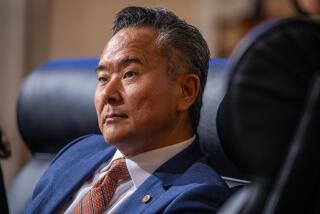Witness Assails Carpenter Reputation for Honesty : Corruption trial: A staff lawyer says the Board of Equalization member made bizarre decisions that benefited businesses.
- Share via
SACRAMENTO — A top lawyer for the State Board of Equalization testified Tuesday that former Sen. Paul Carpenter, now a board member, has a bad reputation for honesty among the agency’s staff.
Gary Jugum, assistant chief counsel for the board, told a federal court jury that Carpenter participated in “strange, bizarre” decisions that resulted in special tax benefits for certain businesses without any apparent foundation in state law.
“They were seemingly without any rational basis,” said Jugum. “People were concerned that things were happening they considered to be strange.”
Jugum was called to the stand by prosecutors as a rebuttal witness to discuss Carpenter’s reputation at the board, where the former senator has served since 1987.
The tax attorney was the final witness in Carpenter’s trial on four counts of racketeering, extortion and conspiracy dating from his days as a Democratic state senator from Norwalk. Closing arguments in the trial are to begin today.
Jugum hinted that Carpenter had been influenced in his actions by campaign contributions and cited three tax cases that he said had alarmed staff members at the Board of Equalization, which administers the state’s business taxes.
In one case, Jugum said, Carpenter advocated allowing service stations to keep taxes improperly collected on the sale of gasohol--a blend of gasoline and alcohol. Jugum said that normally, if the tax could not be returned to consumers, it would be claimed by the state.
In the second case, Carpenter favored giving a tax break to America Honda Products, which had been assessed taxes for dumping toxic waste on its property, Jugum said. Carpenter proposed using a law he had authored as a senator that grants an exemption from the hazardous waste tax if the property was to be used for low-income housing. However, Jugum testified, there was no low-income housing proposed for the site.
Finally, he said, Carpenter favored giving a sales tax exemption to publishers of Yellow Pages telephone directories under a law that was designed to give a tax break to companies that print junk mail. The law had been intended to prevent printing firms in California from losing business to printers in other states where there was no sales tax, he said.
But under cross-examination by defense attorney Gerard Hinckley, Jugum testified that in all three cases, Carpenter was part of a majority on the five-member board that voted to grant the exemptions.
Also, Jugum acknowledged he had no direct evidence that Carpenter received campaign contributions from companies that benefited from the board’s actions.
Earlier, Carpenter finished three days on the witness stand by testifying that he wrote a letter of apology to one prosecution witness who had implicated the former senator in an attempted extortion of a campaign contribution.
Lobbyist Theodore Carthen had testified that he saw Carpenter in 1985 to get his support for a bill to help the Charles Drew Postgraduate Medical School of Los Angeles. But the senator declined to discuss the bill after Carthen said the school could not make contributions, the lobbyist testified.
Carpenter said Tuesday that he did not remember the meeting. But after hearing the lobbyist’s testimony four weeks ago, he said, “I wrote him a letter of apology. From his testimony, I thought I had been unforgiveably rude.”
He also testified that he swore at lobbyist Jeff Thompson and pounded his desk with a campaign contribution report because Thompson had given money to the senator’s 1984 opponent.
“I had a very spirited discussion with Mr. Thompson,” Carpenter said. “I believe that I did use some profanity.”
But Carpenter denied that he blocked legislation sponsored by Thompson, a lobbyist for the California Correctional Peace Officers Assn., in order to obtain a campaign contribution.
Thompson had testified earlier in the trial that he was “shaken down for money” during the 1986 meeting with Carpenter.
After the jury was sent home for the day, U.S. District Judge Edward Garcia rejected a defense motion for a mistrial, ruling that there had been no misconduct by prosecutors in the Carpenter trial.
Hinckley had charged that prosecutors acted improperly by calling Assemblywoman Gwen Moore (D-Los Angeles) to testify before a grand jury in the ongoing federal corruption probe while Carpenter was still on trial. Moore’s testimony behind closed doors generated news stories that Hinckley argued could prejudice the jury.
More to Read
Inside the business of entertainment
The Wide Shot brings you news, analysis and insights on everything from streaming wars to production — and what it all means for the future.
You may occasionally receive promotional content from the Los Angeles Times.










